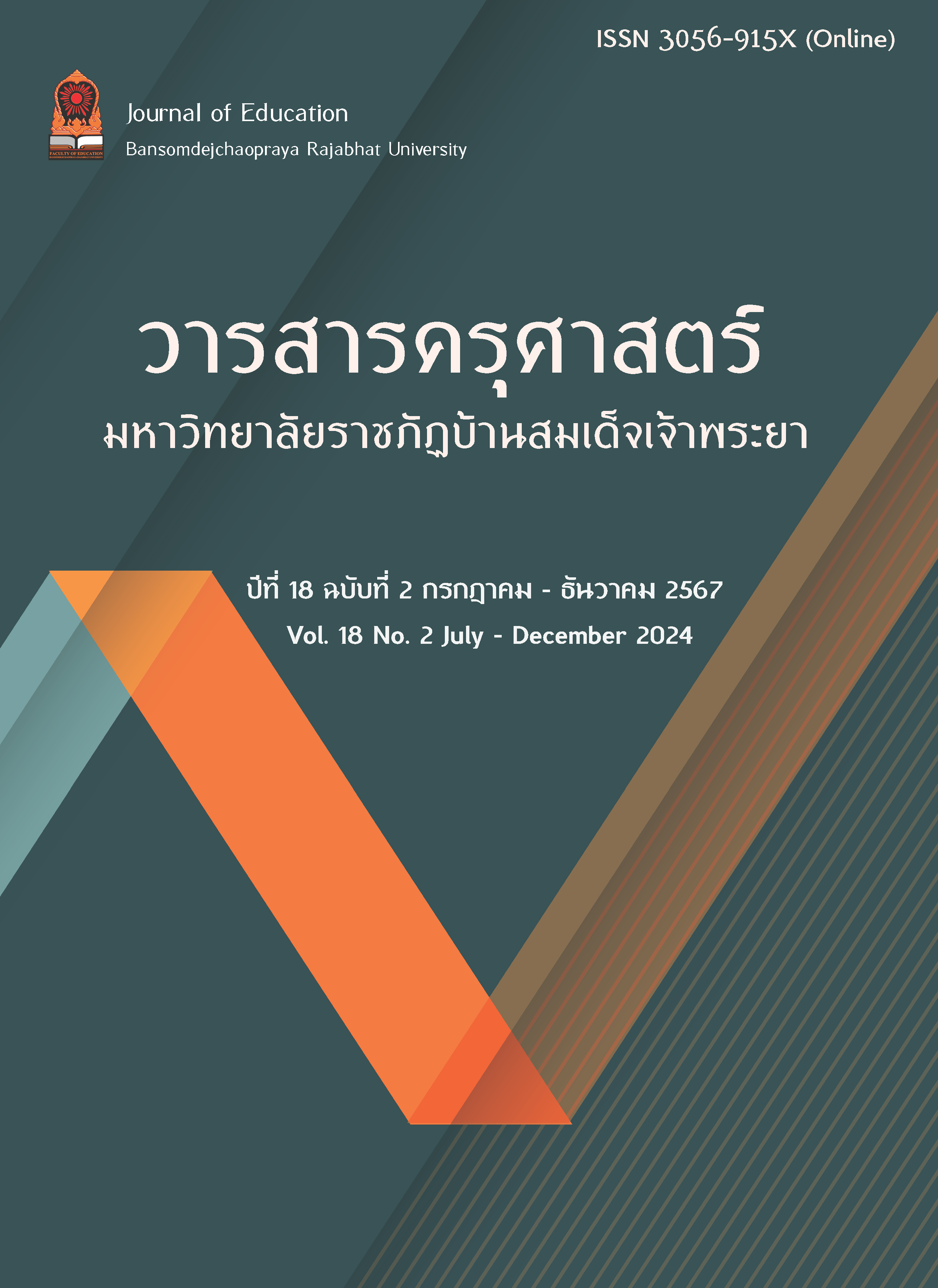Development of activity-based learning lesson for teaching basic electronic components using experiential learning theory
Keywords:
activity-based learning, basic electronic components, experiential learning theoryAbstract
This research aimed to 1) develop and evaluate the effectiveness of an activity-based learning lesson on basic electronic components based on experiential learning theory to meet the 80/80 criterion; and 2) compare the academic achievement before and after learning with the activity-based learning lesson. The participants were 3rd-year secondary school students from schools under the Bangkok Metropolitan Administration who volunteered to participate in the research. A total of 62 students were selected through a voluntary recruitment process for an extracurricular program. The research instruments included 1) an activity-based learning lesson on basic electronic components, consisting of five parts such as what's in an electrical appliance? what is a resistor? what is a diode? what is an LED?, and, what's in the mystery box?; and 2) an academic achievement test. Data were analyzed using mean, standard deviation, and independent samples t-test.
The results showed that 1) the activity-based learning lesson on basic electronic components based on experiential learning theory, was effective, achieving a criterion of 86.52/82.63; and 2) the academic achievement after learning was significantly higher than before learning at the .05 level. This research indicates that activity-based learning integrated with experiential learning theory can significantly enhance students' understanding of electronic components. This has implications for developing higher-order thinking skills and integrating knowledge across various disciplines, such as STEM.
Downloads
References
Rachel Cohen, Bat-Sheva Eylon, and Uri Ganiel. (1983). Potential difference and current in simple electric circuits: A study of students’ concepts. American Journal of Physics, 12(51), 407–412.
Shipstone David. (1988). Pupils' understanding of simple electrical circuits. Some implications for instruction. Journal of Physics Education, 7(23), 92.
Masahiro Kamata and Mayum Abe. (2012). Hand-drawn resistors and a simple tester using a light-emitting diode. Journal of Physics Education, 11(47), 741.
Gorazd Planinšič and Etkina Eugenia. (2014). Light-emitting diodes: A hidden treasure. Journal of The Physics Teacher, 10(52), 94–99.
Etkina Eugenia and Gorazd Planinšič. (2014). Light-emitting diodes: Exploration of underlying Physics. Journal of The Physics Teacher, 10(52), 212–218.
Irwandi Irwandi, Rini Oktavia, Rajibussalim Rajibussalim, and Halim Melvina Si. (2018). Light emitting diode (LED) as an essential prop component for STEM education in the 21st century: A focus for secondary school level. Journal of Physics: Conference Series, 1088, 012060.
Radhika Menon, Aadityan Sridharan, Surya Sankar, Georg Gutjahr, Vani Chithra, and Prema Nedungadi. (2021). Transforming attitudes to science in rural India through activity based learning. AIP Conference Proceedings, 2336, 040003.
Serpil Kara and Oktay Aslan. (2023). Evaluation of the effect of in-class activity-based practices on scientific reasoning skills of pre-service science teachers. International Journal of Science Education, 45(7), 1–22.
Valarie Akerson, Fouad Abd-El-Khalick, and Norman Lederman. (2000). Influence of a reflective explicit activity-based approach on elementary teachers' conceptions of nature of science. Journal of Research in Science Teaching, 37(12), 295–317.
David Kolb. (1984). Experiential learning: Experience as the source of learning and development. Journal of Englewood Cliffs, NJ: Prentice-Hill, 12(4), 123-128.
John Dewey. (1897). My pedagogic creed. The School Journal, 54(5), 77–80.
Jean Piaget. (1952). The origins of intelligence in children: New York : International Universities Press.
Patricia Murrell and Charles Claxton. (1987). Experiential learning theory as a guide for effective teaching. Journal of Counselor Education and Supervision, 27(6), 4–14.
Thomas Morris. (2020). Experiential learning – a systematic review and revision of Kolb’s model. Journal of Interactive Learning Environments, 28(8), 1064–1077.
Downloads
Published
How to Cite
Issue
Section
License
Copyright (c) 2024 Faculty of Educaion Bansomdejchaopraya Rajabhat University

This work is licensed under a Creative Commons Attribution-NonCommercial-NoDerivatives 4.0 International License.
บทความที่ได้รับการตีพิมพ์เป็นลิขสิทธิ์ของคณะครุศาสตร์ มหาวิทยาลัยราชภัฏบ้านสมเด็จเจ้าพระยา
ข้อความที่ปรากฏในบทความแต่ละเรื่องในวารสารวิชาการเล่มนี้เป็นความคิดเห็นส่วนตัวของผู้เขียนแต่ละท่านไม่เกี่ยวข้องกับมหาวิทยาลัยราชภัฏบ้านสมเด็จเจ้าพระยา และคณาจารย์ท่านอื่นๆในมหาวิทยาลัยฯ แต่อย่างใด ความรับผิดชอบองค์ประกอบทั้งหมดของบทความแต่ละเรื่องเป็นของผู้เขียนแต่ละท่าน หากมีความผิดพลาดใดๆ ผู้เขียนแต่ละท่านจะรับผิดชอบบทความของตนเอง



